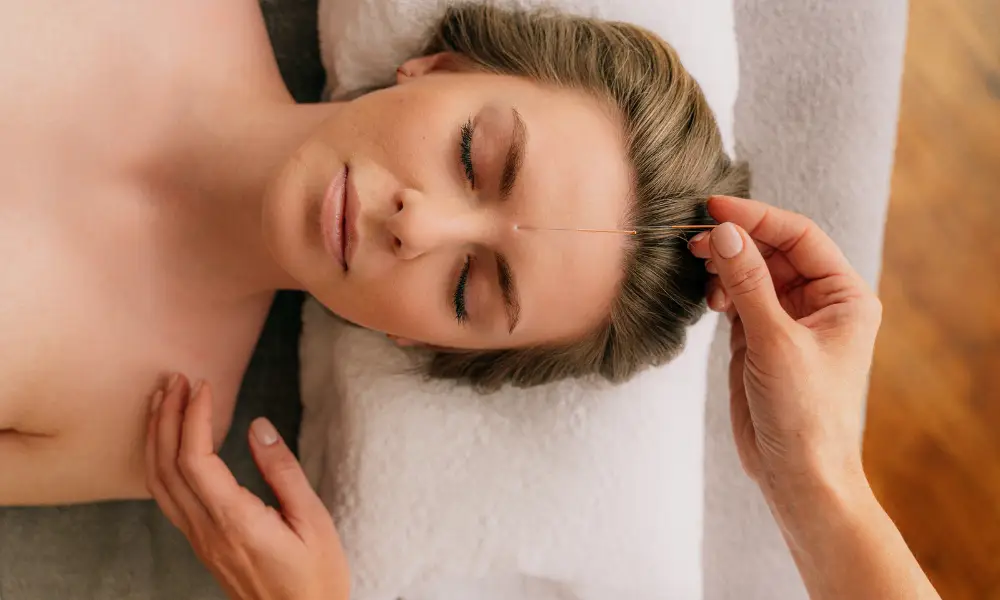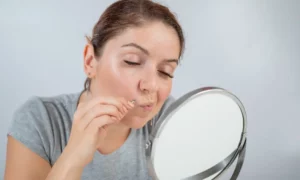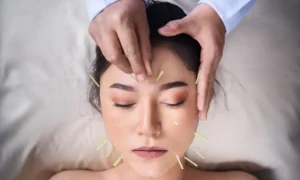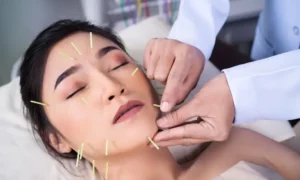Hirsutism, characterized by excessive hair growth in areas where men typically grow hair, is a common concern among women. While conventional treatments exist, an increasing number of individuals are turning to alternative therapies, with acupuncture gaining popularity in the realm of hirsutism management. In this article, we will talk about how hirsutism and acupuncture are linked and how does the process help women with excessive hair growth.
Contents
Understanding Hirsutism 
The excessive growth of coarse, dark hair in areas where men typically grow hair, such as the face, chest, and back, characterizes hirsutism as a medical condition. This condition is more common in women and is often a result of an increased production of androgens, which are male sex hormones. While some degree of hair growth is normal in both men and women, hirsutism refers to an abnormal and excessive amount of hair in areas where it is typically minimal or absent in women.
The excess hair growth in hirsutism is often associated with conditions such as polycystic ovary syndrome (PCOS), which involves hormonal imbalances and can also be influenced by genetic factors. Other potential causes include adrenal gland disorders, tumours, and certain medications.
The Symptoms Of Hirsutism
The primary symptom of hirsutism is the excessive growth of coarse, dark hair in areas where women typically have minimal or no hair. These areas commonly include the following:
- Face: Hirsutism may lead to the growth of noticeable facial hair, particularly on the upper lip, chin, and sides of the face.
- Chest: Women with hirsutism may experience increased hair growth on the chest.
- Back: Excessive hair growth on the back is another common symptom.
- Abdomen: Some women may notice increased hair growth on the abdomen, particularly in the lower abdominal region.
These symptoms are often indicative of an underlying hormonal imbalance, typically involving increased levels of androgens (male sex hormones) such as testosterone. It’s important to note that mild hair growth in these areas is normal for many women, but hirsutism is characterized by an abnormal and excessive amount of coarse, dark hair.
In addition to the physical symptoms, hirsutism may be associated with other signs of hormonal imbalances, such as irregular menstrual cycles, acne, and scalp hair thinning.
Understanding Acupuncture 
Acupuncture is a traditional Chinese medicine (TCM) practice that involves inserting thin needles into specific points on the body to stimulate energy flow, or “qi” (pronounced “chee”), and restore balance to the body’s natural energy pathways. The goal of acupuncture is to promote health and alleviate pain or other ailments by rebalancing the flow of energy.
Key aspects of acupuncture include:
- Needle Insertion
Acupuncture involves the insertion of thin, sterile needles into specific points on the body. These points are located along channels or meridians through which qi is believed to flow. - Meridians and Qi
According to traditional Chinese medicine, there are meridians or pathways in the body through which qi, the vital energy, flows. By inserting needles into specific points along these meridians, acupuncturists aim to balance and restore the flow of qi. - Comprehensive Approach
Acupuncture is based on a holistic approach to health. Practitioners consider not only the specific symptoms but also the overall well-being of the individual. - Traditional Chinese Medicine Philosophy
Acupuncture is rooted in the philosophy of Traditional Chinese Medicine, which views health as a balance between opposing forces, such as yin and yang, and the flow of qi. Imbalances are believed to lead to illness, and acupuncture is one method used to restore harmony. - Pain Management
Acupuncture is commonly used for pain management, and many people seek acupuncture treatments for conditions such as back pain, migraines, osteoarthritis, and various musculoskeletal issues. - Regulation of Qi and Blood
Acupuncture is thought to regulate the flow of qi and blood, promoting circulation and addressing imbalances that may contribute to various health issues. - Individualized Treatment
Acupuncture treatments are often tailored to the individual. Practitioners consider the patient’s specific symptoms, medical history, and overall constitution when determining the placement of needles.
What Is The Relation Between Hirsutism and Acupuncture?
Women with hirsutism experience excessive hair growth in areas that typically exhibit more male-patterned hair, such as the face, chest, and back. This condition often links to an imbalance of hormones, particularly an increased level of androgens (male hormones) or heightened sensitivity of hair follicles to androgens.
Some consider acupuncture, a traditional Chinese medicine practice, as a complementary or alternative therapy for various health conditions, including hormonal imbalances.
Some proponents of acupuncture suggest that it may help regulate hormonal levels and address conditions related to hormonal imbalances, such as hirsutism.
The potential relationship between acupuncture and hirsutism may be based on the following principles:
- Hormonal Regulation
Acupuncture is believed by some to have the ability to influence the endocrine system, which includes hormone-producing glands. Proponents suggest that acupuncture may help regulate hormonal balance, potentially addressing conditions like hirsutism associated with hormonal imbalances. - Blood Flow and Circulation
Acupuncture is thought to improve blood flow and circulation. Some practitioners believe that enhanced circulation may contribute to better hormonal balance and overall health, potentially impacting conditions related to hirsutism. - Stress Reduction
Chronic stress can contribute to hormonal imbalances. The potential stress-reducing effects of acupuncture are known, and it may indirectly influence hormonal balance by alleviating stress.
It’s important to note that, while some individuals may report positive outcomes with acupuncture for various health concerns, including hormonal imbalances, there is limited scientific evidence supporting its efficacy for hirsutism. The research on acupuncture and hirsutism is not conclusive, and more well-designed studies are needed to establish a clear link.
Choosing An Acupuncturist For Hirsutism 
When choosing an acupuncturist for hirsutism, it’s essential to consider several factors to ensure you receive safe and effective care. Here are some tips to help you choose an acupuncturist:
- Credentials and Training
- Check the acupuncturist’s credentials to ensure they are licensed or certified in your region.
- Look for practitioners who have completed a formal education in acupuncture from a reputable institution.
- Consider their experience and specialization in treating hormonal or reproductive health issues, such as hirsutism.
- Reviews and Recommendations
- Read reviews and testimonials from previous patients to gauge their experiences with the acupuncturist.
- Ask for recommendations from friends, family, or healthcare professionals who may have experience with acupuncture or related treatments.
- Communication and Comfort
- Schedule an initial consultation to discuss your specific concerns and assess the acupuncturist’s communication style.
- Ensure you feel comfortable discussing your symptoms and that the acupuncturist listens attentively to your concerns.
- Cleanliness and Safety
- Visit the acupuncture clinic or office to assess its cleanliness and adherence to safety standards.
- Ensure that the acupuncturist uses sterile needles and follows proper hygiene practices.
- Treatment Approach
- Discuss the acupuncturist’s treatment approach and whether they have experience in addressing hormonal imbalances and conditions like hirsutism.
- Ask about their success rates and what you can expect from the treatment.
- Cost and Insurance
- Clarify the number of sessions that might need any additional costs associated with the treatment plan.
- Consultation and Assessment
- A reputable acupuncturist will conduct a thorough assessment before beginning treatment. This may include discussing your medical history, lifestyle, and specific symptoms related to hirsutism.
Remember that healthcare professionals consider acupuncture a complementary therapy. While it may provide relief for some individuals, it’s important to consult with a healthcare professional for a comprehensive evaluation and diagnosis of conditions like hirsutism.






